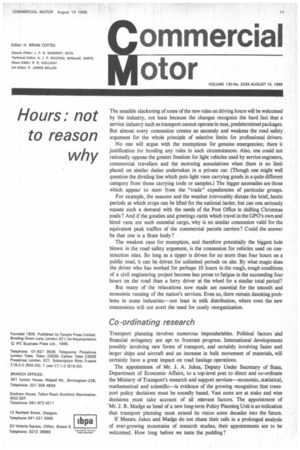Hours: not to reason why
Page 13

If you've noticed an error in this article please click here to report it so we can fix it.
The sensible slackening of some of the new rules on driving hours will be welcomed by the industry, not least because the changes recognize the hard fact that a service industry such as transport cannot operate in neat, predetermined packages. But almost every concession creates an anomaly and weakens the road safety argument for the whole principle of selective limits for professional drivers.
No one will argue with the exemptions for genuine emergencies; there is justification for bending any rules in such circumstances. Also, one could not rationally oppose the greater freedom for light vehicles used by service engineers, commercial travellers and the motoring associations when there is no limit placed on similar duties undertaken in a private car. (Though one might well question the dividing line which puts Light vans carrying goods in a quite different category from those carrying tools or samples.) The bigger anomalies are those which appear to stem from the "trade" expediencies of particular groups.
For example, the seasons and the weather irrevocably dictate the brief, hectic periods at which crops can be lifted for the national larder, but can one seriously equate such a demand with the needs of the Post Office in shifting Christmas mails ? And if the goodies and greetings cards which travel in the GPO's own and hired vans are such essential cargo, why is no similar concession valid for the equivalent peak traffics of the commercial parcels carriers ? Could the answer be that one is a State body ?
The weakest case for exemption, and therefore potentially the biggest hole blown in the road safety argument, is the concession for vehicles used on construction sites. So long as a tipper is driven for no more than four hours on a public road, it can be driven for unlimited periods on site. By what magic does the driver who has worked for perhaps 10 hours in the rough, tough conditions of a civil engineering project become less prone to fatigue in the succeeding four hours on the road than a lorry driver at the wheel for a similar total period?
But many of the relaxations now made are essential for the smooth and economic running of the nation's services. Even so, there remain daunting problems in some industries—not least in milk distribution, where even the new concessions will not avert the need for costly reorganization.
Co-ordinating research
Transport planning involves numerous imponderables. Political factors and financial stringency are apt to frustrate progress. International developments possibly involving new forms of transport, and certainly involving faster and larger ships and aircraft and an increase in bulk movement of materials, will certainly have a great impact on road haulage operations.
The appointment of Mr. J. A. Jukes, Deputy Under Secretary of State, Department of Economic Affairs, to a top-level post to direct and co-ordinate the Ministry of Transport's research and support services—economic, statistical, mathematical and scientific—is evidence of the growing recognition that transport policy decisions must be soundly based. Vast sums are at stake and wise decisions must take account of all relevant factors. The appointment of R. Madge as head of a new long-term Policy Planning Unit is an indication that transport planning must extend its vision some decades into the future. If Messrs. Jukes and Madge do not chase their tails in a prolonged analysis of ever-growing mountains of research studies, their appointments are to be welcomed. How long before we taste the pudding ?






































































































